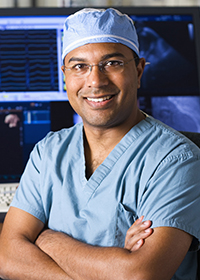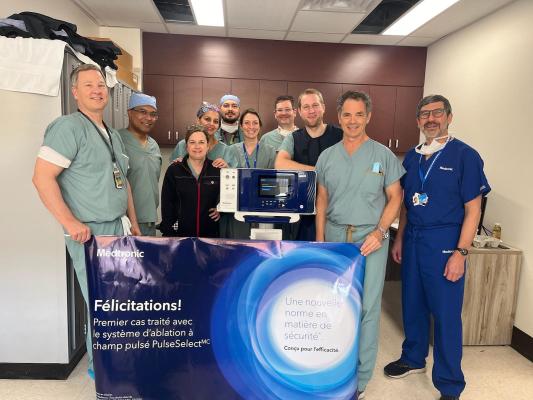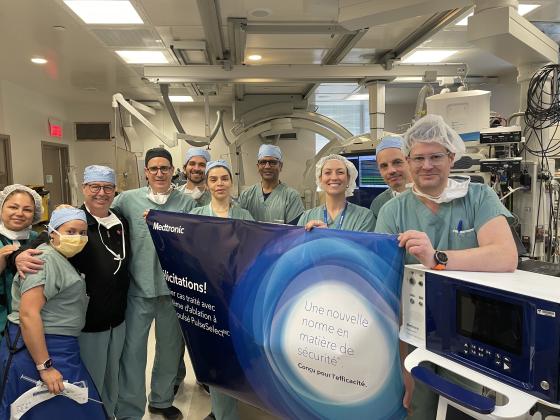Safe and efficient: A new technology for patients with cardiac arrhythmias arrives at the MUHC
Montreal, May 8, 2024 - The McGill University Health Centre (MUHC) is the first healthcare centre in Quebec to offer pulse field ablation as a minimally invasive procedure to treat atrial fibrillation, the most common form of cardiac arrhythmia. Not only is this new technology safer than the standard catheter ablation technologies, it is also more efficient. It could therefore help diminish the waiting lists for that intervention.
“We are pleased to be able to provide our patients with the highest quality of care by making the latest technologies available to our professionals. This would not have been possible without the multidisciplinary collaboration of the MUHC teams,” says Dr. Atul Verma, Director of the MUHC Division of Cardiology and a Scientist in the Cardiovascular Health Across the Lifespan (CHAL) Program at the Research Institute of the McGill University Health Centre (RI-MUHC).

The MUHC is one of Canada's leading players in the testing of cutting-edge techniques to treat atrial fibrillation. A global multicentre clinical study led by Dr. Verma evaluated the safety and efficacy of Medtronic's PulseSelectTM pulsed field ablation (PFA) system. The results of the trial, published in March 2023 in the prestigious journal Circulation, led to the approval of the technology by Health Canada. After the approval on December 13, 2023, the MUHC quickly channeled its resources and was able to offer the procedure to a patient for the very first time, outside of a clinical trial, on Wednesday, April 17.
A common disorder
Atrial fibrillation is a very common heart condition, affecting over 60 million people worldwide. In Canada, greater than 5 per cent of people aged 65 and over suffer from it. Fibrillation results from a disturbance in the heart's electrical signals and is characterized by an irregular, and often rapid heart rate. This disorder increases the risk of stroke, heart failure and death.
Atrial fibrillation can be treated with antiarrhythmic drugs, but almost half of patients will require minimally-invasive intervention to eliminate the heart tissue causing the arrhythmia.
“By preventing the long-term complications of atrial fibrillation, ablation has the potential to improve health and reduce the use of healthcare resources and hospital admissions,” explains Dr. Vidal Essebag, Medical Director of Cardiac Electrophysiology at the MUHC.
A new technology arrives
For the past 20 years, ablation has typically been performed with catheter ablation techniques using cryotherapy or radiofrequency, which involve destroying the problematic heart tissue by intense cold or heat. This creates a scar that interrupts the abnormal electrical signal that causes arrhythmia. Instead of using thermal energy, PulseSelectTM emits pulsed electric fields to interrupt the irregular electrical signals responsible for atrial fibrillation.
“Although effective, cryoablation and radiofrequency ablation can lead to complications, such as injuring tissue that is close to the heart. Pulsed field ablation eliminates this risk by targeting only problematic heart tissue,” explains Dr. Atul Verma, who is also Associate Professor of Medicine at McGill University. These pulses can be delivered more efficiently than thermal energy. “The procedure is very well tolerated, and patients recover rapidly with a brief hospital stay,” adds Dr. Verma. “In Quebec, waiting lists for this procedure are relatively long. Increasing access to safe and efficient procedures with short recovery times will optimize resource utilization and reduce hospitalizations related to management of atrial fibrillation and its complications.”
A team effort
The team from Cardiology, Cardiac Electrophysiology, Nursing and Supply worked together to bring this new technology to the MUHC.
“We were able to conclude, in a very short space of time, a structuring project for the MUHC in the best interest of the patient, and at the same time respond to imperatives linked to the management of waiting lists,” explains Mtre Hamadi Bahri, MUHC Associate Director of Procurement.
“I’m very proud of our team and what we accomplish for our patients,” says Steeve Gaudreault, Nurse Advisor in Specialized Products at the MUHC. “Cooperation between the various teams is essential for patient-centred care.”


Atrial fibrillation research at the MUHC
Over the past 15 years, the cardiology teams at the MUHC worked closely with research teams at the RI-MUHC and with industry partners to bring the latest and most promising minimally invasive ablation technologies to their patients. This work is only possible because of the exceptional competence and collaboration of the electrophysiology personnel, which includes nurses, medical radiology technologists, anesthesiologists, international fellows, respiratory technicians, and research staff who work together to advance research, evaluate technologies and deliver patient-centred care.
Media contact
Evelyne Dufresne
Information Officer, MUHC
[email protected]

